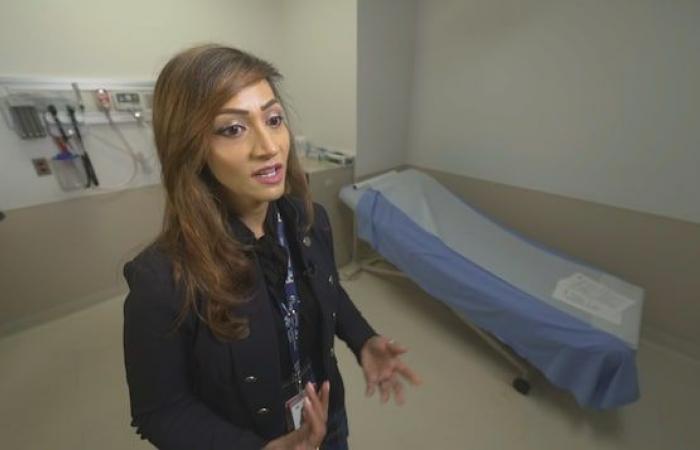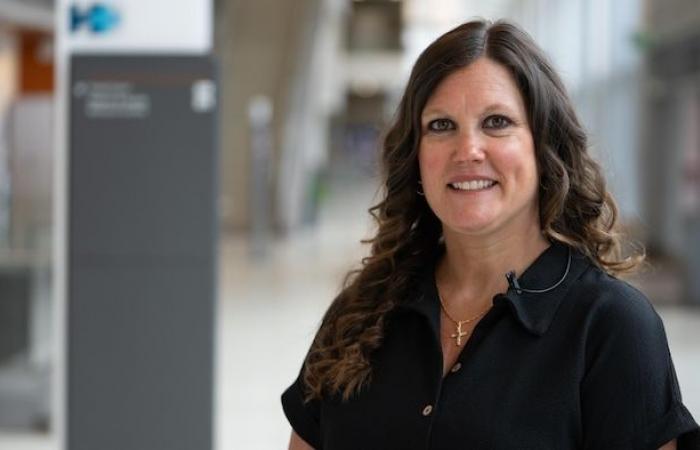women’s Health Week promoted the coalition for women’s health is starting: it takes place from May 5 to 11. It is in this context that health professionals say they are concerned about Canadian access to health care.
I would say that Canada has become complacent in terms of access to care and in terms of technological advancements
said Jhanvi Solanki, vice-president of clinical programs at the hospital Humber River de Toronto, during an interview with Radio-Canada.
She is one of the experts who sound the alarm on the situation of women’s health in Canada. She observes the consequences of these shortcomings daily in her establishment.
In fact, according to the Hologic world Health Health Hologic index, almost half of Canadians are dissatisfied with access to quality health care in their region. This data comes from the latest report published by Hologic, a medical technology company.
However, according to the same report, Canadian women are less and less satisfied with their health in general: the place of Canada in the list of this report is down sharply compared to previous years.
Hard to find a family doctor
Accessibility to health care has led women to trust less
explained Isabelle Fortier, Canadian director of government relations and market access at Hologic Canada in an interview on Sunday.

Open in full screen
Isabelle Fortier is Canadian Director of Government Relations at Hologic Canada.
Photo : Radio-Canada
She specifies that the opinions of women concerning safety and access to health have experienced a significant decline. Ms. Fortier explains that the report written by the company shows that over the years, A point that has really decreased – by 11 % – is the opinions on health related to health. As I mentioned, women feel less safe and have less confidence in the health system
she said.
Ms. Fortier attributes this drop in confidence to several factors, in particular the lack of access to family physicians.
Eloquent testimonies
With all the responsibilities that women have, such as having children, we forget to take care of our own health
said Ann Millermet in downtown Toronto Sunday afternoon.
Becca Weston25, adds: I have my health well in hand, but I do not always feel like I am taken seriously by doctors, especially when it comes to typically female health problems. If I say that there is something that does not go with my rules, they first offer contraception or simplistic solutions. […] You must continually defend your cause.
Carolyn MacLeodalso met in the city center, is a nurse. She shares a similar observation: I work in the health field and I am familiar with the system, and I still find that it is very difficult to navigate through the system as a patient
she explained.
I have all the possible advantages: I was born in Canada, I speak English fluently, I work in the health sector. And despite everything, it’s difficult. So when I put myself in the place of newly arrived people or who do not speak English well …

Jhanvi Solenki is the vice-president of clinical programs at Humber River Hospital in Toronto.
Photo : Radio-Canada
Disturbing waiting times
According to Ms. Solanki, women face considerable obstacles to access gynecological care. For some mild gynecological problems, women can wait between three months and a year to obtain a final diagnosis
she explained.
She points out that the course often starts with the family doctor and continues to the specialist’s office, with waiting times at each stage. When we see women in our clinic, we really try to find options to assess, diagnose and treat in the same space as much as possible
she added.
Faced with these challenges, the hospital Humber River has developed an innovative approach. Ms. Solanki and her team created an external clinic to reduce waiting times in gynecology.
It is a small operating room outside the operating room
she described. According to her, this initiative would have made it possible to pass the waiting time for a hysteroscopy of more than a year to just a few weeks.
To set up this project, the team had to be daring. We had to be creative. We put the initiative in motion without asking for permission, if we can say, and that was the right thing to do
she said.
A national strategy
Experts in the health sector of women are asking for a concerted action at the federal level. Amy FloodManaging Director of Women’s Health Collective Canadamilitates for the creation of a national strategy.

Open in full screen
Amy Flood is general manager of Women’s Health Collective Canada.
Photo : Radio-Canada / Ken Townsend
We really hope for a national federal strategy dedicated to the health of women
She said during an interview on Sunday.
According to her, the problem is systemic and cannot be resolved only by personal or local initiatives. The medical system needs absolute remodeling. We must consider women differently, both medical and personal and professional
she said.
A decline in four years
Canada fell into the world index ranking [Hologic] From the health of women for 4 years, we have lost 20 points. We are now at 63rd in 142 countries
said Ms. Fortier. It is not a disaster, but it shows us that we unfortunately do not progress as fast as the other countries
according to her. The report was published in November 2024.
Among the countries with high income and still according to the report, Canada is now ranking 10th out of 11, behind countries like Australia, the United Kingdom and the United States.
The detailed statistics of the report show that Canada gets a global score of 55 out of 100, where 100 out of 100 is a perfect note. In the different dimensions evaluated, the results are variable: 22 out of 100 for preventive care, 61 out of 100 for emotional health, 67 out of 100 for opinions on health and safety, 83 out of 100 for basic needs and 70 out of 100 for individual health.
According to information from Andréane Williams and Rozenn Nicolle
METHODOLOGY
The Hologic Global Women’s Health Index – Year 4 is an annual report produced by Hologic in partnership with Gallup. It is based on a survey carried out in 2023 in nearly 146,000 people aged 15 or over, in 142 countries and territories. The results (from 0 to 100) are calculated only from women’s responses. The data was collected mainly by interviews in person, or by telephone in high -income countries, according to random sampling methodologies specific to each country. The results are weighted according to the most recent censuses.
The index assesses five dimensions of women’s health: preventive care, emotional health, perception of health and safety, basic needs, and individual health.
Financing and transparency
The report is entirely funded by Hologic, a company specializing in medical technology related to the health of women (cancer screening, mammography, tests ofITSetc.). Some conclusions relate to areas where Hologic is commercially active. Although Gallup affirms its independence in the collection and analysis of the data, the questions have been developed with Hologic. No potential conflict of interest is explicitly mentioned in the report.











